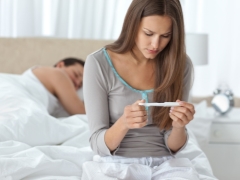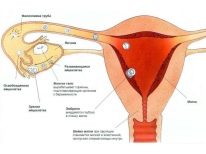Everything about female infertility: from symptoms and causes to treatment
Being a mother for a woman is natural, because nature has provided such a role for her. But some of the fair sex are faced with the inability to conceive a baby. In which cases we are talking about female infertility, what causes it, how to treat various forms of disorders of female reproductive function - all this is described in the article.
What it is?
Female infertility is a serious psychological and emotional trauma not only for the woman herself, but also for her partner, because once in any couple there is a question about the need for having children. Infertility can not be normal, because the female body is designed in such a way that everything in it is provided for the carrying and birth of the baby.
Very often, women wonder about possible infertility after several months of unsuccessful attempts to conceive a child. However, in medicine there are clear parameters by which a woman can be considered barren. They talk about possible infertility only if the couple fail to conceive a child for two years. In this case, a man and a woman should have a regular sex life, sexual contacts should be unprotected.
Directly the diagnosis of "infertility" can be made only after a thorough examination. It must pass both spouses, because sometimes the reason for the lack of children lies not only in the features of the female body. Only if you know for sure that a man is completely healthy and can have children, can we talk about female infertility.
If male infertility is mainly based on violations of the composition or amount of sperm, as well as abnormalities of the vas deferens, then there are significantly more types of female infertility. The female body is more complex, and the processes that take place in it every month are amazing and multifaceted. At any stage of the functioning of the reproductive system of the woman may fail, which will prevent the conception of the baby.
Male fertile constantly, that is, his ability to fertilize almost unchanged throughout life. A woman is fertile only a few days a month, and the number of her ovules allocated to her for life is limited.. When they run low, menopause begins.
A healthy woman can conceive a baby only in the middle of the menstrual cycle: on the day of ovulation or during the day after it. However, spermatozoa can wait for the egg from the follicle. Therefore, days from 11-12 to 15-16 days of the menstrual cycle are considered favorable for conceiving (with a standard cycle duration of 28 days). With a rather long cycle, the days that are suitable for sexual intercourse are shifted to a higher direction, with a shorter duration - to a lesser one.
We can talk about infertility if a woman knows for sure the periods of her ovulation, monitors the menstrual cycle when partners enter into unprotected sexual contact at the right time for conception, but cannot achieve the desired result. In this case, it is necessary to establish the type and cause of the violation in order to understand whether it can be handled and how to do it.
Kinds
Infertility in women can be absolute and relative.Absolute in medicine is a violation caused by the anatomical features of the reproductive system organs (there are no ovaries from birth, there is no uterus, tubes). When such pathologies are found in a girl, doctors usually cannot change anything - nature itself has not provided for such a woman to multiply. Even plastic surgery for the implantation of donor ovaries or the creation of missing tubes usually do not work and are still experimental. Such infertility, fortunately, is rarely diagnosed. It is in most cases congenital or genetic.
Relative infertility is always caused by some factor or group of adverse factors in the presence of normal anatomical data. In most cases, with relative infertility after the establishment and elimination of the exact cause, the doctors manage to help the woman to become a mother. This form of infertility is amenable to correction.
In addition, infertility in the fair sex can be primary and secondary. They talk about the primary in the event that a woman has difficulty with the conception of a first-born child, when she had no previous pregnancies, including those that ended in miscarriages and abortions. Secondary infertility is called a violation that occurs if a woman had a pregnancy before, but they ended unsuccessfully or the birth of a child.
Recently, there has been a significant increase in secondary female infertility throughout the world - many women who have children from their first marriage, for example, cannot conceive a baby in a second or third marriage. Even the same spouses do not always succeed in conceiving a second child. Each such case requires detailed consideration, because the reasons are not always determined by ultrasound or according to test data.
Sometimes the lack of fertility is a consequence of a deep psychological trauma, stress experienced, problems of an emotional level.
In addition, there are several types of infertility caused by the causes of the condition.
- Immunological. Such infertility is indicated if a woman’s body produces antisperm antibodies or antibodies against the embryo. In the first case (in case of autoimmune infertility), conception becomes impossible, since the immunity of a woman throws a whole army of antibodies on spermatozoa and destroys them even on the way to the egg cell. In the second case, we are talking about chronic miscarriage. During the conception, the immunity of the woman does everything possible to get rid of the baby, because he is only half genetically similar to the maternal organism, and the second 50% in his genocode are the paternal genes.
- Endocrine. This is a fairly common type of female infertility associated with hormonal disorders. And we are talking here not only about the violation of the production and balance of sex hormones, but also about the disruption of the thyroid gland, hypothalamus and pituitary, as well as a few dozen hormonal abnormalities.
- Anovulatory. Even in a healthy woman, ovulation does not happen every month. But in some cases the number of anovulatory cycles is predominant or habitual. If a woman does not mature and does not leave an egg follicle, ready for fertilization, conception cannot take place.
- Tube-peritoneal. This type of infertility implies a violation of the patency of the fallopian tubes. First, mobile and small spermatozoa make their way through them, and after fertilization, a fertilized egg descends through the tube to implant in the uterine cavity.
If the patency of the pipe is broken, the conception may not take place, or the egg cell may die on the way to the uterus. Also in this case, it may be fixed in the tube, and an ectopic pregnancy, doomed to interrupt, will begin.
- Uterine. With this type of infertility, a woman has a congenital or acquired anomaly of the structure of the uterus. Such anomalies include the saddle or two-horned uterus, hypoplasia of the main reproductive organ of women, as well as some acquired anomalies: tumors, post-abortion changes of the endometrium, and other problems. In this form, the embryo has almost no chance to consolidate in the uterine cavity, implantation does not occur.
- Idiopathic. Such infertility is indicated in the case when there are no objective reasons for impaired fertility in a woman according to the results of the survey. Her reproductive organs are in perfect order, there is no immunological factor, everything is in order with hormonal background, ovulation occurs, but conception does not occur. This is the most mysterious form of pathology, since no one knows exactly what needs to be done with it.
Quite often, psychological infertility is “masked” in this way, and a woman who undergoes a detailed diagnostic examination hears the diagnosis “idiopathic infertility”, because the real reason lies in the psyche and emotional mood.
In most cases, women are dominated by such types of infertility as hormonal, anovulatory, uterine and tubal-peritoneal. They account for up to 80% of all cases. Often, types of infertility are diagnosed mixed, for example, hormonal disorders as a result of which lead to ovarian dysfunction and menstrual cycle or anovulatory cycles. In this case, infertility is considered endocrine-anovulatory, and hormonal imbalance against the background of simultaneous obstruction of the fallopian tubes is an endocrine-tubular form of infertility.
About 30% of all cases of infertility occur in a variant of the uterine form - the endometrioid form of infertility. About 7% of cases are assigned to immune infertility, and almost 15% of couples after the examination are considered completely healthy, that is, infertility in their case has an idiopathic form.
For successful treatment, it is not so much the type of infertility that is important as the correct determination of its root cause. If there are several reasons, it is important to determine the main factor that has launched a cascade of undesirable processes and changes in the female body.
Causes and symptoms
The reasons for which the female reproductive function may be impaired, quite a lot.
Hormones
In the overwhelming majority of cases in women with the hormonal form of infertility, increased production of prolactin, as well as problems with sex and thyrotropic hormones, prevent conception. Such a pathology may develop due to a malfunction of the sex glands, the thyroid gland, as well as the pituitary and hypothalamus.
Hypothalamic-pituitary disorders can develop as the long-term effects of traumatic brain injury, chest injuries, and brain tumors. In this case, increased production of prolactin, which suppresses the production of follicle-stimulating hormones. In the body of a woman does not develop and does not mature egg, the ovaries lose their function. The symptoms of this condition are quite characteristic: the woman becomes very irregular, and then rare until the complete disappearance, menstruation.
Hyperandrogenism can also cause infertility. This complex term denotes the excess production of male sex hormones. Their small amount is very important for the normal functioning of the female body, but excess, on the contrary, suppresses reproductive functions. Male hormones are produced by the adrenal cortex and ovaries.
The symptoms of such endocrine infertility also have a quite characteristic picture: the woman is obese, her hair grows male-like (mustache or even beard, there is hair growth on the chest or back).Monthly go irregularly, sometimes uterine bleeding can occur in the middle of the cycle, for several months menstruation may be absent.
Women with thyroid diseases can not only have difficulty conceiving, but also run the risk of not putting up the baby if conception does take place. Moreover, with toxic goiter significantly increases the likelihood of having a baby with developmental abnormalities.
When estrogen and progesterone balance is disturbed, it is often possible to conceive a baby, but it is almost impossible to take it out without the intervention of doctors. Endocrine disorders in a woman's body often cause cirrhosis of the liver, severe heart and kidney diseases, as well as cancer, tuberculosis and hepatitis.
Endocrine infertility prone women with a large number of extra pounds and with underweight. That is why too thin and too full women are frequent reproductive patient patients.
In almost all hormonal disorders, women note such a bright distinguishing feature as a violation of the menstrual cycle. Menstruation may begin with a delay of a week or six months, they may be excessively abundant or very scarce. Every second woman with endocrine disorders does not ovulate. Often among the additional symptoms are such as the release of colostrum from the nipples, engorgement and pain in the mammary glands, nagging pain and a feeling of heaviness in the lower abdomen and lower back.
In women, there may be increased acne, the appearance of strange pigment spots, hair loss. Stretch marks are formed on the skin, blood pressure is very unstable, before the onset of menstruation a woman notes a significant deterioration in health and severe emotional “swing”.
If the baby cannot be conceived, and the woman notes such symptoms and signs in herself, she should be examined by a gynecologist and an endocrinologist to determine which hormones are prevalent and what is missing to correct the condition.
Obstruction of the fallopian tubes
One impassable tube reduces the chances of conceiving a baby by 50%, but in this case they are not talking about infertility. A sterile woman is considered to have a woman with bilateral obstruction of the fallopian tubes. Usually a violation of the lumen of the fallopian tubes is not an independent disease, but acts as a consequence of other diseases.
The most often provoking factor is inflammation in the ovaries. The pipes become more dense and, finally, “stick together”. Transient ectopic pregnancy, appendicitis, infectious diseases, including ureaplasma, chlamydia can be the cause of obstruction. Among the common causes of obstruction are fibroids, a history of abortion, and abdominal trauma, which resulted in their deformation.
Infertility for this reason is diagnosed in about one out of every four women who consult a doctor after several years of unsuccessful pregnancy planning. Symptoms may not be - the main feature is the absence of conception. But concomitant diseases that lead to obstruction, usually have clinical symptoms.
As inflammatory and infectious causes prevail, a woman can pay attention to the appearance of pain in the lower abdomen and on the sides, in the lower back, unusual discharge with a yellow, greenish, gray and brown shade and a very unpleasant odor, sometimes accompanied by itching. Pain is often observed during sexual intercourse and during menstruation. Monthly most often abundant.
If you find such symptoms and the absence of the desired pregnancy, you need to visit the gynecologist as soon as possible and pass tests for infections and microflora. This will allow time to identify inflammation and start treatment.
Quite often, this form is found among secondary cases of infertility.It is caused by surgery on the pelvic organs, the presence of adhesions, as well as injuries in previous births.
Sometimes the tubes that do not have sufficient contractile ability, that is, cannot help the egg cell to move into the uterus, are also called impassable. Violation can be caused by genetic causes, and microbial inflammation, as well as some hormonal disorders. If a girl had an inflammation of the appendages when she was still in her teens, then the probability of obstruction of the fallopian tubes at a more mature age increases by 60%.
Immunological forms
Anti-sperm antibodies that produce female immunity are most commonly found in cervical mucus. The cervical factor makes conception virtually impossible, because sperm are neutralized before it enters the uterine cavity. Sometimes antibodies are contained in the intrauterine fluid, in which case the male germ cells do not enter the fallopian tubes and cannot reach the egg even with regular ovulation.
During ovulation in a healthy woman, a sufficient amount of T-suppressors is produced, which suppress the activity of antisperm antibodies. They can be produced at all, because sperm are by no means cells related to the female body. In immune infertility, T-suppressors are not sufficiently produced or not produced at all, and the amount of antibodies exceeds the permissible norms.
The causes of this form of infertility are quite complex, and not all of them are fully understood. Most often the pathology develops due to the contact of the body of a woman with sperm, which has a high content of white blood cells or bacterial flora. Doctors believe that frequent anal and oral sex increases the likelihood of developing such a form of infertility, because with them sperm gets into the gastrointestinal tract and causes a certain immune response.
Abnormal attempts at artificial insemination, coagulation of cervical erosion, hormonal failure, which occurred during an unsuccessful IVF attempt, during the establishment of the intrauterine device, can be the cause of the pathology.
In fairness, it should be noted that immune infertility occurs with equal frequency in men, and sperm itself may contain antisperm antibodies.
Symptoms of immunological infertility does not happen. Partners do not feel the destructive microscopic processes that occur after ejaculation. The only sign indicating a possible autoimmune or immune infertility is the fact that there is no pregnancy for quite a long time. In women, the menstrual cycle is not broken, there are no pains, unusual discharges, the examination does not reveal pathologies on the part of the genital and pelvic organs, the hormonal background is within the normal range.
If a woman has impaired immune factors at the level of implantation of a fertilized ovum, she may notice slight monthly delays of 5-7 days, after which abundant than usual menses begin. Pregnancy, which nevertheless was, but was not fixed in the uterus, while women do not even guess, finding other explanations for the delay.
Pathology of the uterus
Congenital abnormalities of the uterus are not as common as it may seem. Most of the uterine type of infertility is acquired diseases and anomalies of the reproductive female organ.
In the first place, abortions and medical scraping are the reasons. Such interventions disrupt the structure of the inner layer of the uterus, which is responsible for the successful implantation and development of the embryo. After them, endometriosis, endometrial polyps may develop. Endometrial disorders also result in increased levels of estrogen in the body of the fair sex.
Every fifth woman of reproductive age with uterine factor of infertility is prevented from getting myoma nodules, and every second is endometriosis. Synechiae in the uterus also create a mechanical obstacle to pregnancy. They can form after abortion, endometritis or genital tuberculosis. Also, the uterine form of infertility is characteristic of women who have been protected for a long time with the help of an intrauterine device.
Unsuccessful curettage of the uterus or complicated labor, after which parts of the placenta or bone remains of the fetus remain, are also prerequisites for the development of subsequent secondary infertility. Cervical factor - polyps and cervical hypertrophy.
Symptoms, as in the case of pipes, may not be, if the underlying disease does not give a clear clinical picture. If the uterine form of infertility associated with endometriosis, it is possible the appearance of smearing brownish discharge in the days between regular menstruation. If the inability to conceive a baby is associated with myoma, the symptoms will be more pronounced - constipation, copious and painful periods. With synechia menstruation is scanty and rare up to complete amenorrhea (absence of menstruation).
Due to the rather high prevalence of this form of female infertility, the gynecologist will check the condition of the uterus of the patient who applied to it first.
Psychosexual disorders
Psychosexual disorders are the most controversial forms of female infertility. The reason for the lack of the desired pregnancy can be constant stress, conflicts at work, at home, excessive loads.
Recently, more and more women who do not find obvious medical reasons for infertility are advised to contact a psychotherapist or a psychosomatist. They will help to discover the hidden reasons why a woman’s body refuses to strive for motherhood.
Among the psychological reasons for the absence of pregnancy, negative experiences from childhood are the most frequent: girls who have been abused by their mothers and fathers, incest victims often cannot conceive a child at a conscious age due to some heavy “blocks” that prevent this. Pregnancy often does not occur in a couple where a woman does not love and does not want a spouse, even if sexual acts between them occur regularly.
Uncertainty of women in the future, difficult financial situation, lack of housing, help from relatives are also often the reason why pregnancy does not occur. Doctors in this case only shrug their shoulders - idiopathic infertility, what to do is unknown.
A good psychotherapist has a lot of ways in the arsenal to identify the reasons for a woman’s reluctance to have children. This is precisely about reluctance, which she herself is not aware of. A specialist in psychosomatics can help to understand the past, as well as a woman's view of the present, the future, to help get rid of negative attitudes.
Special attention should be paid to psychological infertility, which develops against the background of an obsessive desire to have a child. If a woman concentrates all her strength on this task, when all her thoughts are about whether it was possible to conceive a baby this month, then stress hormones gradually become natural for her hormonal background, and the production of some sex hormones decreases. Pregnancy does not occur already because the woman herself makes her sterile by her experiences.
If you manage to calm down and stop thinking about conception, then everything is restored and, as a rule, the woman becomes pregnant. The most common example is adopted children. As soon as the couple is tired of fighting, accepted and acknowledged the fact of idiopathic infertility, and decided to take the child from an orphanage or infant home, a certain calm comes.The woman focuses on other issues and tasks on caring for the child. After several menstrual cycles, it is quite possible that she will discover the pregnancy to her great surprise and the surprise of all her acquaintances.
Psychological reasons for the absence of pregnancy quite often develop in women who behave like men: they wear men's clothes, work in men's positions, they do everything themselves, and they constantly strive for domination and independence. Also in psychosomatics, a special place is given to the paternal factor — more often, girls who grow up in a family with a weak-willed, weak-character father suffer from a decrease in fertility and abilities.
Another fairly common reason for the absence of pregnancy is fear. A woman can not get pregnant just because unconsciously she is terribly afraid of birth pain, the birth of a disabled child, as well as sexual intercourse during pregnancy.
However, stress is an adaptive mechanism, he always strives to bring about such changes in the body, so that they (the body) can be used to its advantage. If a woman is afraid of childbirth, stress hormones will block the sex hormones to prevent pregnancy. If there is a negative experience from the past, then stress will not allow the occurrence of an “interesting” situation due to the fact that there is a fear of motherhood and a subconscious desire to prevent it.
Diagnostics
In the absence of pregnancy for a year or more, a woman should definitely contact an appointment with a gynecologist. This specialist will make a detailed questionnaire, which will include the complaints of the woman and her obstetric history. Be sure to tell your doctor the duration of the last three menstrual cycles, the duration of delays, if any, the nature of menstrual bleeding (profusion, uniformity, pain).
A woman must be informed about all the pregnancies that she had before and their outcome. If there are complaints of any pain, unusual discharge, tenderness in the area of the mammary glands, then you should definitely tell the doctor about them. Also the hereditary factor deserves special attention. If the patient's mother or grandmother had gynecological problems, they should definitely be told in the initial conversation.
The task of diagnosis is much simpler if the woman provides the doctor with the results of the partner’s sperm analysis, a spermogram that reflects the partner’s reproductive health status. Then the search area will be limited to the female body.
Further actions of the doctor will consist in the choice of methods of inspection of the woman. All methods that are used to diagnose female infertility are divided into general and special. Common ones include the determination of weight, height, blood pressure, skin and hair condition, body type. Special methods include instrumental, laboratory and functional tests.
On a gynecological examination, the doctor will pay attention to the structure and anatomical features of the genital organs, uterus, cervix, ligamentous apparatus, and also evaluate the discharge from the genital tract and take a smear on the vaginal microflora.
A woman may be advised to start measuring basal temperature. To do this, from the first day after the end of the next menstruation, it is necessary to find out the temperature in the anus in the morning, without getting out of bed after waking up. The woman should write down results and make out in the form of the schedule. A month later, the doctor will be able to assess the menstrual cycle, understand how the ovaries work, and whether ovulation occurs.
Cervical mucus undergoes laboratory studies, during which its index is determined in points. The closer the result is to normal, the more reason there is to say that the woman’s estrogen is all right.Also conducted a study, which received the name of the postcoital test. Its essence lies in the determination of the activity of sperm some time after their entry into the genital tract. This method is necessary to exclude immunological infertility.
Hormonal analyzes of urine and blood are considered to be the most important for the diagnosis of female infertility. It is important for a woman to remember that they should not be taken after an examination by a doctor, after sexual intercourse, early in the morning, because the level of hormones after the above actions changes. To determine the peculiarities of the work of the adrenal cortex, urine is passed to DHEA-C and 17-ketosteroids. This analysis can be done on any day of the menstrual cycle.
On the 5-7th day of the cycle, you should take a blood test for testosterone, prolactin, cortisol. At the same time it is best to analyze the thyroid hormones (T3, T4, TSH).
On days 20-22 of the cycle (it should be calculated from the first day of menstruation), you can do an analysis of the progesterone blood concentration. This study will provide an opportunity to understand whether ovulation occurred, as well as whether progesterone levels are sufficient to support pregnancy, if it took place.
When a woman has a menstrual cycle, she is always recommended blood tests for LH, FSH, estradiol.
Among the hormonal tests, a progesterone or estrogen-progestin test, as well as a clomiphene test or a test with dexamethasone, may be prescribed. The essence of such tests is reduced to a simple clinical experiment. A woman is injected with a certain hormonal substance, and by means of laboratory tests of her blood and urine, she is monitored for changes in her body.
It is mandatory for all women who have difficulties with natural conception, are prescribed tests for such infections as chlamydia, toxoplasmosis, rubella, cytomegalovirus infection, gonorrhea, trichomoniasis and genital herpes. The causative agents of these diseases seriously affect reproductive functions, and the woman herself may not even suspect that she has cytomegalovirus or mycoplasmosis.
A radiography of the pelvis is required, as well as colposcopy, which allows to study the condition and structure of the cervix. If an inflammatory process is found in the cervix, it is imperative to find out its true cause and pathogen.
All women are prescribed vaginal ultrasound to assess the size of the uterus, ovaries, the presence of tubes. If a uterine type of infertility is detected in this case, the patient will be asked to undergo a chest X-ray and make tuberculin tests to rule out tuberculosis.
Hysterosalpingography is considered an informative method of research. This is an x-ray of the uterus and its appendages, which allows you to see the tumors, nodes, as well as obstruction of the fallopian tubes, which usually cannot be seen on an ultrasound. A woman whose doctor suspects lack of fertility due to endometrial conditions can be diagnosed by curettage. A sample of the endometrium after it is sent for histological examination.
Sometimes there is a need for surgical diagnosis - diagnostic laparoscopy or hysteroscopy. Hysteroscopy has recently been introduced into the national standard for examining female infertility. As part of this procedure, a small hysteroscope camera is introduced into the uterus, which shows the condition of the uterine cavity, the cervical canal. This study is conducted in a hospital under general anesthesia.
Diagnostic laparoscopy is performed to study the fallopian tubes, ovaries. For this, a small incision is made in the anterior abdominal wall through which the laparoscope is inserted. The image of internal processes and features is transmitted to the screen in real time. This method is very popular in cases of suspected ectopic pregnancy, obstruction of the fallopian tubes, adhesions in the pelvis and ovarian cysts.The procedure also takes place under general anesthesia in a hospital setting.
Fear of surgical diagnosis for infertility is not worth it. Usually, a woman can leave the hospital for 2-3 days after the procedure and go home. And the value of the information obtained as a result of a survey is difficult to compare with other research methods — it is immeasurably higher.
After identifying the cause or complex cause, the doctor prescribes treatment and evaluates the prognosis.
Treatment
Treatment begins immediately after establishing the cause. First of all, it is necessary to eliminate the cause. If this is inflammation, the woman is prescribed a course of anti-inflammatory drugs, antibiotics - it all depends on the type and location of the inflammatory process. If hormonal disorders cause hormone therapy. When infertility is associated with anovulation, drugs are prescribed to stimulate ovulation at dosages directly dependent on the degree and type of disorder.
If drug therapy is impractical, for example, in case of polyps, a woman is undergoing a surgical intervention that will help eliminate the root cause of the lack of fertility. After the recovery process, the patient will be able to start planning a pregnancy. If the cause of infertility cannot be eliminated and corrected with medication or a scalpel, it is suggested that the woman should have methods of assisted reproductive medicine - IVF.
In obesity, women are advised to start losing weight - dropping just 5% of body weight increases the probability of conceiving naturally several times. Women who have not identified pathologies, it is recommended to visit a psychotherapist or psychosomat. A course of hypnotherapy, physiotherapy, as well as taking vitamins and sedatives can completely eliminate the psychogenic cause of infertility.
When the reason for the absence of pregnancy is in violation of ovulation, stimulation treatment is prescribed, which is carried out under ultrasound control, so doctors can monitor the process of follicle maturation. 70% of women this treatment helps to become mothers. If infertility is due to age-related decline in fertility (a woman wants to become a mother at 40, but does not work), intensive hormone therapy is also carried out.
In the case when the reason lies in the obstruction of the tubes, laparoscopic surgery is performed. It allows you to restore the lumen of the fallopian tubes in about 40% of cases. For other women, including those with neglected, long-lasting forms of tubular obstruction, IVF is recommended.
Surgery for uterine infertility is mainly cosmetic and reconstructive. The effectiveness of such treatment is about 20%, that is, every fifth patient succeeds in getting pregnant after the operation. In some cases (for example, in the absence of the uterus or its gross abnormality), only a surrogate mother can bear and give birth to a child.
In endometriosis, the affected areas of the epithelium are surgically cauterized, and every third infertile woman with such a diagnosis can become pregnant after a course of treatment.
Quite often, it is enough for the female sex to conduct general conservative treatment, which improves the quality of the eggs and helps to normalize the menstrual cycle. Such drugs and dietary supplements as Ovariamin, Vasalamin and Inositol, which is also called the “vitamin of youth”, are usually prescribed. And with inflammatory and adhesive processes, Longidase candles and Laennec injectable medicine, which is made on the basis of recycled placental tissue, are very popular.
A woman is recommended vitamins and vitamin complexes rich in vitamins A, E, D, as well as folic acid and magnesium. Folk remedies offer decoctions of grass boron uterus, as well as chamomile and sage. It is important to eat and monitor their weight and drinking regime.
If pills, shots, and other medicines do not help, doctors may recommend artificial insemination. Indications for it are:
- lack of effect from surgical or conservative treatment;
- the presence of bilateral obstruction of the pipe;
- endocrine sterility, which cannot be corrected by hormones (“Proginova”, “Progesterone”, “HCG” do not work for several courses of treatment);
- depleted ovaries;
- any pathology in which natural pregnancy is physically impossible;
- lack of pipes;
- certain forms of uterine infertility.
Artificial insemination
It is possible to relate to assisted reproductive methods in different ways, but the fact remains that they are sometimes the only way to know the joy of motherhood. If the doctor suggests an IO, you should not refuse. It can be carried out in different ways. Some women need intrauterine insemination. The sperm of the husband or donor is injected into the uterus. Such methods are good for the immune cervical or cervical factor: the sperm passes the “dangerous” area and immediately, thanks to the efforts of doctors, enters the uterine cavity.
The IVF method involves the removal of a woman's egg and fertilization in the laboratory. After that, fertilized eggs are placed in the uterus. A woman receives the necessary hormonal treatment so that the embryos take root and develop.
ICSI is the method by which the sperm enters the egg cell with a thin needle. For fertilization, choose only the best and healthy sperm. After that, the fertilized egg is placed in the uterus. Donor eggs can also be used for artificial insemination if their own women do not mature, and donor embryo can also be replanted.
In the extreme case, there is surrogate motherhood, and attitudes towards him in society change for the better with each passing year.
Prevention
Prevention of female infertility should begin to engage in childhood. In unpleasant inflammatory diseases in childhood and adolescence, the girl will be protected from intimate hygiene, as well as the understanding that the future woman should not be supercooled and sit on cold surfaces, lift large weights. A girl from childhood should understand that it is important to guard against flu and scarlet fever, measles and diphtheria, because these diseases may be complicated by gynecological problems in the future. She should avoid traumatic brain injuries, abdominal and chest injuries.
Particular attention should be paid to mothers survey daughters, whose monthly began too early or too late. Early age is considered to be up to 10 years old, and late - after 16 years. These girls have an increased risk of developing primary or secondary infertility.
For adolescents diets are dangerous: along with the extra pounds, and stocks of female sex hormones go. Undesirable and early onset of sexual activity. Physiologically, the girl is ready for her only to come of age, and not at 14, 15 or 17 years old. Early sex life can cause a “discord” of all systems and connections in the reproductive function.
A young and mature woman should be aware of the dangers and dangers of abortion (including medication), advanced inflammatory processes that have not been treated for a long time. A woman who plans to become a mother should watch her weight, avoid exhaustion and obesity, eat a balanced and correct diet. A woman should not get involved in alcohol and smoking, and drugs - this is the right way into the ranks of fruitless.
Indiscriminate sex life, sexually transmitted infections, incorrect contraception hormonal and other means that are not coordinated with the doctor can lead to the development of infertility.The likelihood of having problems with conceiving a baby later is higher in women, who often douche with chemicals and also have sex during menstruation.
Reviews
According to the reviews of women who have left on the thematic forums, the treatment of infertility takes a lot of time. In the process of therapy, it is important not to lose hope and not to despair. On the contrary, the faster a woman can put herself in order of self-esteem, and the sooner she will no longer feel inferior, the more effective will be the treatment prescribed by the doctor.
Women consider gynecological massage and physiotherapy effective. Is it possible to use them, tell your doctor, because these procedures also have their own contraindications.
Infertility is most difficult to treat after gonorrhea, chlamydia, and other infections. Women have to undergo several courses of treatment, and they are not always effective. According to statistics, infertility is successfully treated in about 80% of women.
For the causes and treatment of female infertility, see the following video.




















































































